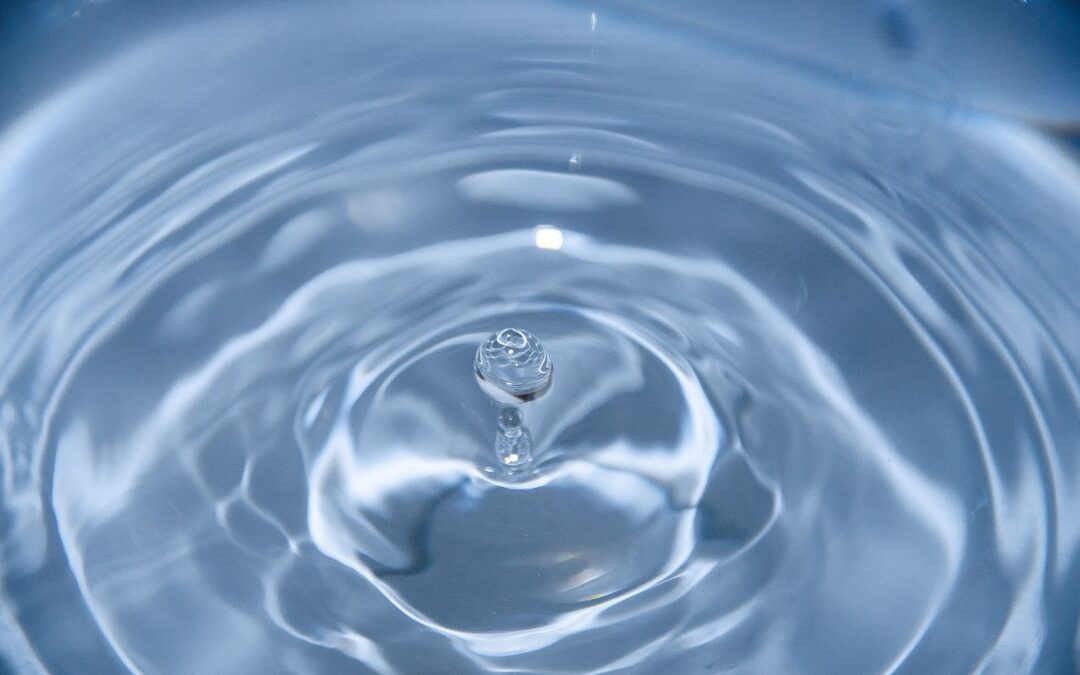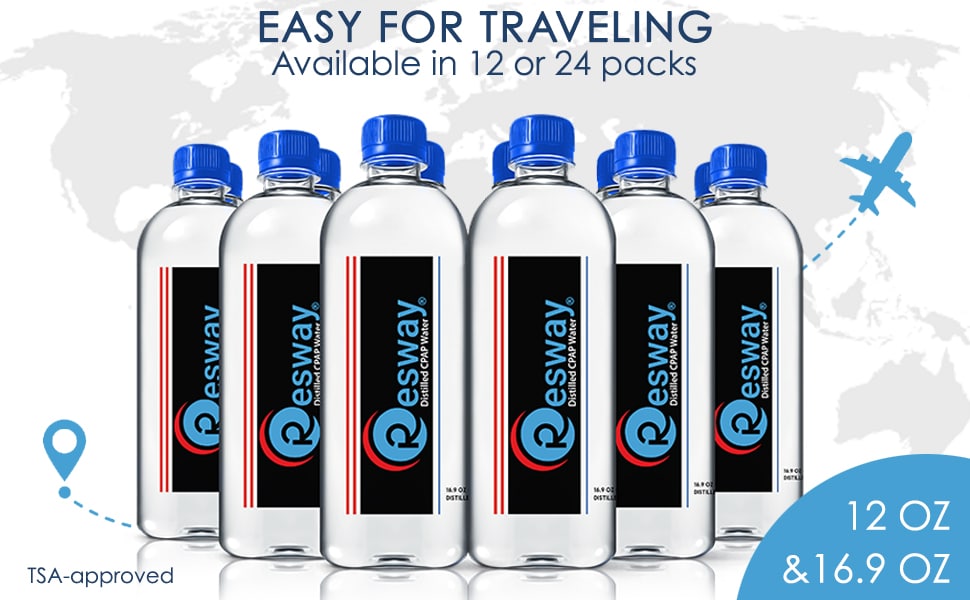Water isn’t just a component; it’s a vital element that significantly influences the effectiveness and comfort of CPAP treatment. Understanding its importance is key for anyone relying on CPAP machines for better sleep and improved health.
This article aims to demystify the complexities surrounding CPAP water use. We will explore and answer 10 common concerns that CPAP users frequently encounter. From the type of water best suited for your CPAP machine to maintenance tips for your humidifier, we cover it all. Our goal is to provide clear, reliable, and practical advice to ensure your CPAP therapy is as effective and hygienic as possible.
What Type of Water Is Best For CPAP Machines?
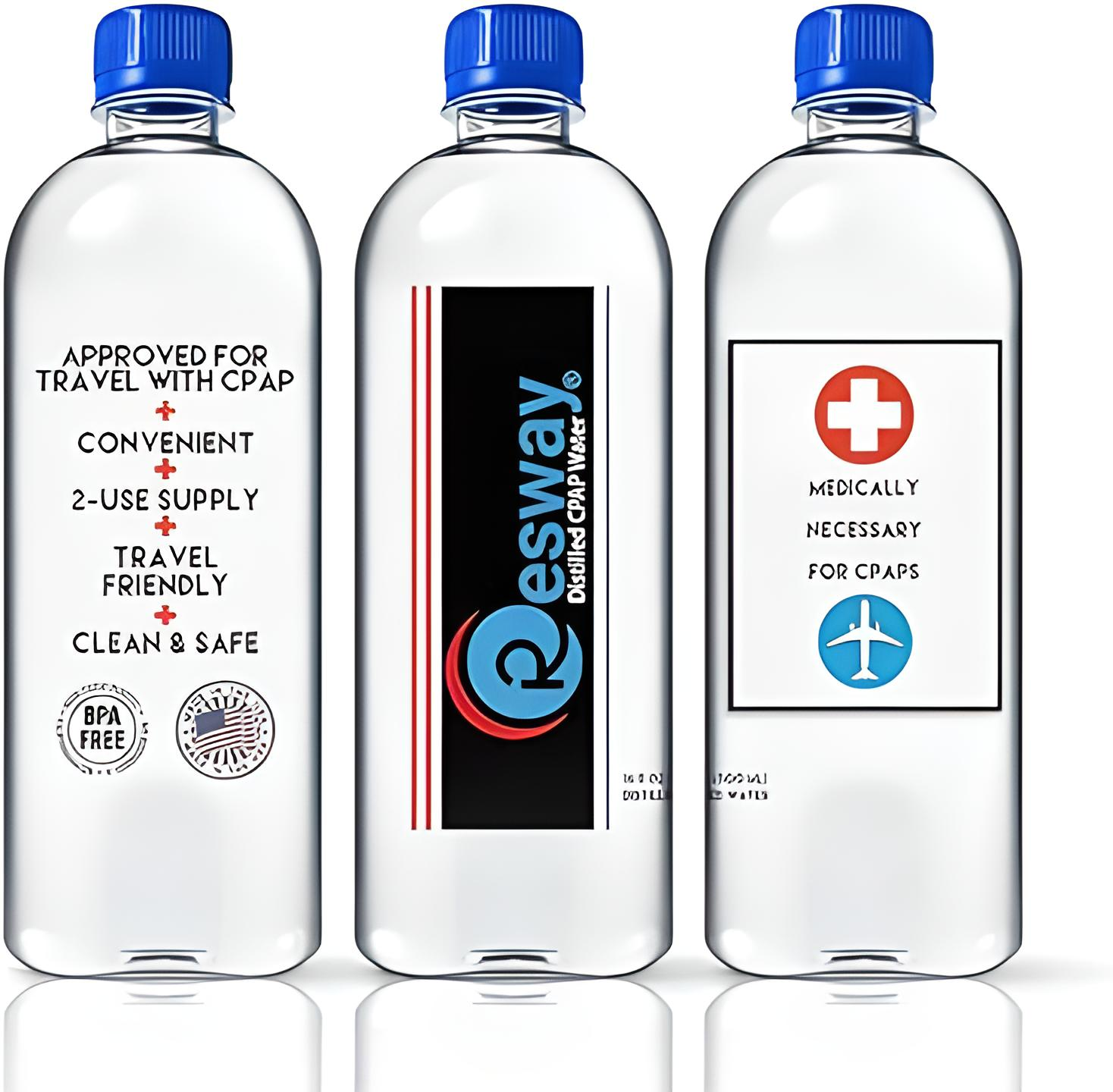
In addressing the CPAP Water FAQ, a primary query emerges: what type of water is best for CPAP machines? This is among the common concerns about CPAP water, as the choice of water can significantly impact both the longevity of the machine and the health of the user.
Distilled Water
Distilled water is often recommended for CPAP machines due to its purity. Without minerals and impurities, it minimizes the risk of mineral buildup in the machine’s water tank and humidifier, ensuring a longer lifespan of the equipment and cleaner air for the user.
Tap Water
While convenient, tap water is generally not advised for CPAP machines. The minerals and chemicals commonly found in tap water can lead to mineral deposits in the machine, potentially damaging it and reducing its efficiency.
Bottled Water
Bottled water, which includes purified and spring water, seems like a safe bet. However, not all bottled waters are created equal. Some may contain minerals that can harm your CPAP machine. Purified water, being free from minerals and contaminants, is a safer choice compared to mineral water or spring water.
Purified Water
Purified water undergoes a filtration process that removes chemicals and impurities, making it a suitable option for CPAP machines. However, it’s important to ensure that the purification process is thorough, making it akin to distilled water.
Spring Water
Spring water, often celebrated for its natural mineral content, is not ideal for CPAP use. The minerals, while beneficial for drinking, can contribute to residue buildup in the machine.
While each type of water has its pros and cons, distilled water stands out as the best choice for CPAP machines due to its lack of minerals and impurities. This choice helps to safeguard both the device and the health of its user.
Can I Use Tap Water In My CPAP Machine?
A common concern about CPAP water revolves around the use of tap water in CPAP machines. Many CPAP users ponder over the safety and potential risks associated with using tap water, given its easy accessibility and cost-effectiveness.
Safety Concerns
Tap water, while safe for drinking, can pose certain risks when used in CPAP machines. The main issue lies in the mineral content and potential contaminants found in tap water. These can lead to mineral buildup in the CPAP machine’s water tank and humidifier. Over time, this buildup can impair the machine’s functionality and hygiene, potentially affecting the quality of air delivered during therapy.
Health Implications
Regular use of tap water in CPAP machines might also pose health risks. The minerals and impurities can be dispersed into the air pathway and inhaled by the user. This could lead to respiratory issues or exacerbate existing health conditions.
Maintenance Challenges
Using tap water can increase the maintenance frequency for your CPAP machine. The mineral deposits can be tough to clean and, if not managed properly, can significantly shorten the lifespan of your device.
While tap water might seem like a convenient choice, it is not recommended for CPAP machines due to the potential risks and maintenance challenges it poses. For optimal safety and performance, distilled or purified water remains the best option
What Are The Risks Of Using The Wrong Type Of Water?
In our CPAP Water FAQ, it’s crucial to address the risks associated with using the wrong type of water in CPAP machines. The type of water used can significantly impact both the machine and the user’s health.
Mineral Buildup
One of the primary risks is mineral buildup. Water types like tap water, mineral water, and sometimes even spring water contain minerals that can deposit inside the machine’s water tank and humidifier. This buildup can reduce the efficiency of the machine, necessitating more frequent cleanings and potentially leading to costly repairs or replacements.
Health Risks
The wrong type of water can also pose health risks to CPAP users. Mineral particles and other impurities can become part of the air stream and be inhaled. This can irritate the respiratory tract, potentially leading to inflammation or exacerbating existing conditions like asthma or allergies.
Machine Damage
Over time, using water with high mineral content can corrode or clog the internal components of the CPAP machine. This not only diminishes its efficacy but also shortens its overall lifespan.
Bacterial Growth
Inadequately purified water may contain bacteria or microorganisms, which, when used in CPAP machines, can proliferate in the humid environment. Regular inhalation of such contaminated air can lead to respiratory infections.
To mitigate these risks, it is advised to use distilled or purified water in CPAP machines. These types of water are free from minerals and impurities, safeguarding both the user’s health and the machine’s functionality.
Is Distilled Water Necessary For CPAP Machines?
Addressing one of the common concerns about CPAP water, we delve into the question: Is distilled water necessary for CPAP machines? This query is especially important given the specific needs of these devices for water purity.
Purity of Distilled Water
Distilled water is the preferred choice for CPAP machines due to its high purity level. It undergoes a distillation process that removes impurities and minerals, making it ideal for preventing mineral buildup in the CPAP humidifier and water tank. This not only extends the lifespan of the machine but also ensures that the air quality remains high.
Health Benefits
For CPAP users, the health benefits of using distilled water are significant. It reduces the risk of inhaling any mineral particles or contaminants, thus minimizing potential respiratory irritations or infections.
Maintenance Ease
Using distilled water also eases maintenance requirements. It prevents the formation of hard-to-clean deposits inside the machine, simplifying the cleaning process and ensuring efficient operation.
Is It Essential?
While CPAP machines can technically function with other types of water, distilled water is strongly recommended to maximize both the device’s lifespan and the user’s health. It’s a small investment that can lead to fewer complications and more effective therapy in the long run.
Distilled water is highly recommended for CPAP machines due to its purity, health benefits, and ease of maintenance. It stands out as the safest and most effective choice for CPAP users.
Can I Make My Own Distilled Water For CPAP Use?
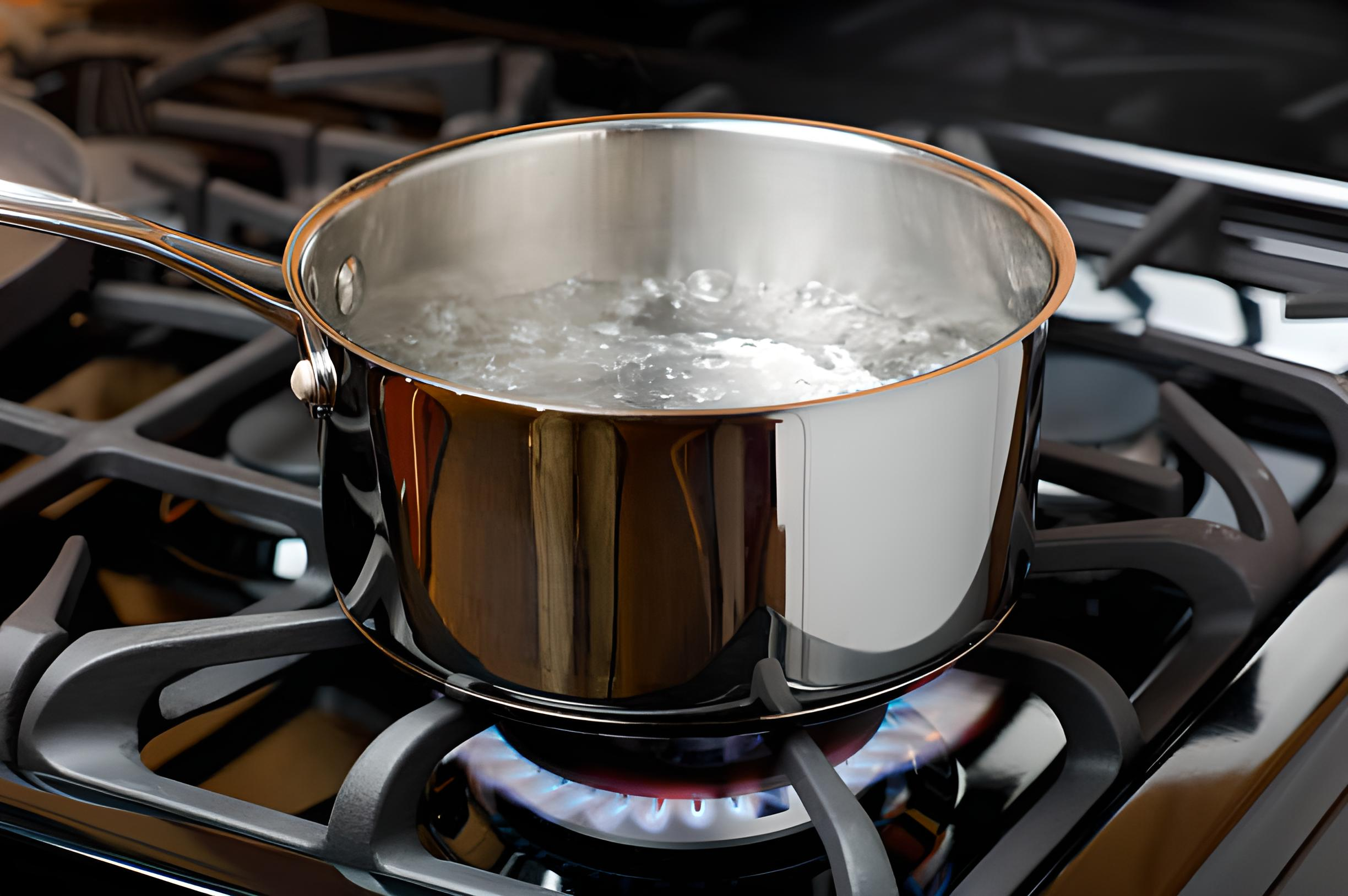
Many CPAP users wonder if they can make their own distilled water for their machines, as a cost-effective alternative to buying it. This section explores the feasibility of DIY methods for distilling water and how they compare to store-bought distilled water.
DIY Distillation Process
Creating your own distilled water involves boiling water to produce steam and then condensing this steam back into water. This process removes minerals and impurities, making it similar in purity to commercially available distilled water. However, it’s important to ensure that the condensation setup is clean and free from contaminants.
Comparison With Store-Bought Distilled Water
While homemade distilled water can be a viable option, it may not always achieve the same level of purity as store-bought distilled water. Commercial distillation processes are typically more rigorous and controlled, ensuring consistent water quality.
Cost And Convenience
DIY distillation can be more cost-effective in the long run, but it requires an initial investment in equipment and a considerable amount of time. For many, the convenience of purchasing distilled water outweighs the benefits of making it at home.
Considerations For CPAP Users
CPAP users should weigh the pros and cons of homemade versus store-bought distilled water. If opting for the DIY route, it’s crucial to ensure that the water produced is as pure as possible to avoid any potential issues with the CPAP machine or health risks.
While it is possible to make your own distilled water for CPAP use, the process requires careful consideration. CPAP users must balance factors of purity, cost, and convenience to decide what’s best for their situation.
Is Boiled Water A Safe Alternative For CPAP Machines?
When exploring the CPAP water FAQ, a common query is whether boiled water serves as a safe and effective alternative for CPAP machines. This question is especially pertinent for those seeking convenient solutions for their CPAP water needs.
Effectiveness of Boiled Water
Boiling water can remove some impurities and kill bacteria, making it safer than untreated tap water. However, it does not remove minerals, meaning it’s not as effective as distilled water in preventing mineral buildup in the CPAP machine. Over time, this can lead to issues with the machine’s water tank and humidifier.
Safety Considerations
While boiled water is generally safer than unprocessed tap water, it’s not the ideal choice for CPAP machines. The remaining minerals in boiled water can still contribute to the buildup and potentially affect the air quality and hygiene of the CPAP system.
Comparison With Distilled Water
Distilled water, in contrast to boiled water, goes through a process of evaporation and condensation, removing virtually all minerals and impurities. This makes it a more suitable option for CPAP machines, as it helps maintain the device’s efficiency and ensures cleaner air for the user.
Although boiling water may seem like a convenient alternative, it falls short in comparison to distilled water in terms of safety and effectiveness for CPAP use. Users are advised to opt for distilled water to avoid potential risks and maintain the longevity of their CPAP machine.
How Does Mineral Content In Water Affect My CPAP Machine?
A crucial aspect of the CPAP water FAQ is understanding how the mineral content in water affects CPAP machines. This issue is directly related to both the longevity of the machine and the health of the user.
Water with high mineral content, such as tap water or mineral water, can lead to mineral buildup in the CPAP machine, particularly in the water tank and humidifier. This buildup can clog and corrode internal components, reducing the efficiency and lifespan of the machine. Regular maintenance becomes more demanding and frequent, and in some cases, parts may need early replacement.
For CPAP users, the mineral content in water is not just a mechanical concern. When minerals from water become part of the air you breathe, they can cause irritation in the respiratory tract. Over time, this can lead to discomfort and potential health issues, especially for those with pre-existing respiratory conditions.
To prevent these problems, using distilled or purified water is highly recommended. These types of water have minimal to no mineral content, significantly reducing the risk of buildup and ensuring the air delivered by the CPAP machine is as clean as possible.
What About Using Advanced Filtration Methods?
Exploring advanced filtration methods for CPAP machines is an integral part of ensuring optimal water quality. One such method, reverse osmosis, is often considered by CPAP users seeking a reliable water source.
Reverse osmosis (RO) is a filtration process that removes impurities, including minerals and contaminants, from water. This process makes RO water quite similar to distilled water in purity, potentially making it a suitable choice for CPAP machines.
RO water, due to its low mineral content, is less likely to cause mineral buildup in the CPAP machine’s water tank and humidifier. This helps in maintaining the machine’s efficiency and prolonging its lifespan. Moreover, the purity of RO water means a lower risk of inhaling contaminants, which is beneficial for the respiratory health of CPAP users.
While RO water is a good alternative, it’s important to note that it might not be as pure as distilled water. The distillation process ensures the removal of virtually all impurities, while reverse osmosis water might leave behind trace amounts. Therefore, while RO water is a viable option, distilled water remains the gold standard for CPAP machines.
How Do I Properly Maintain My CPAP Water Tank And Humidifier?
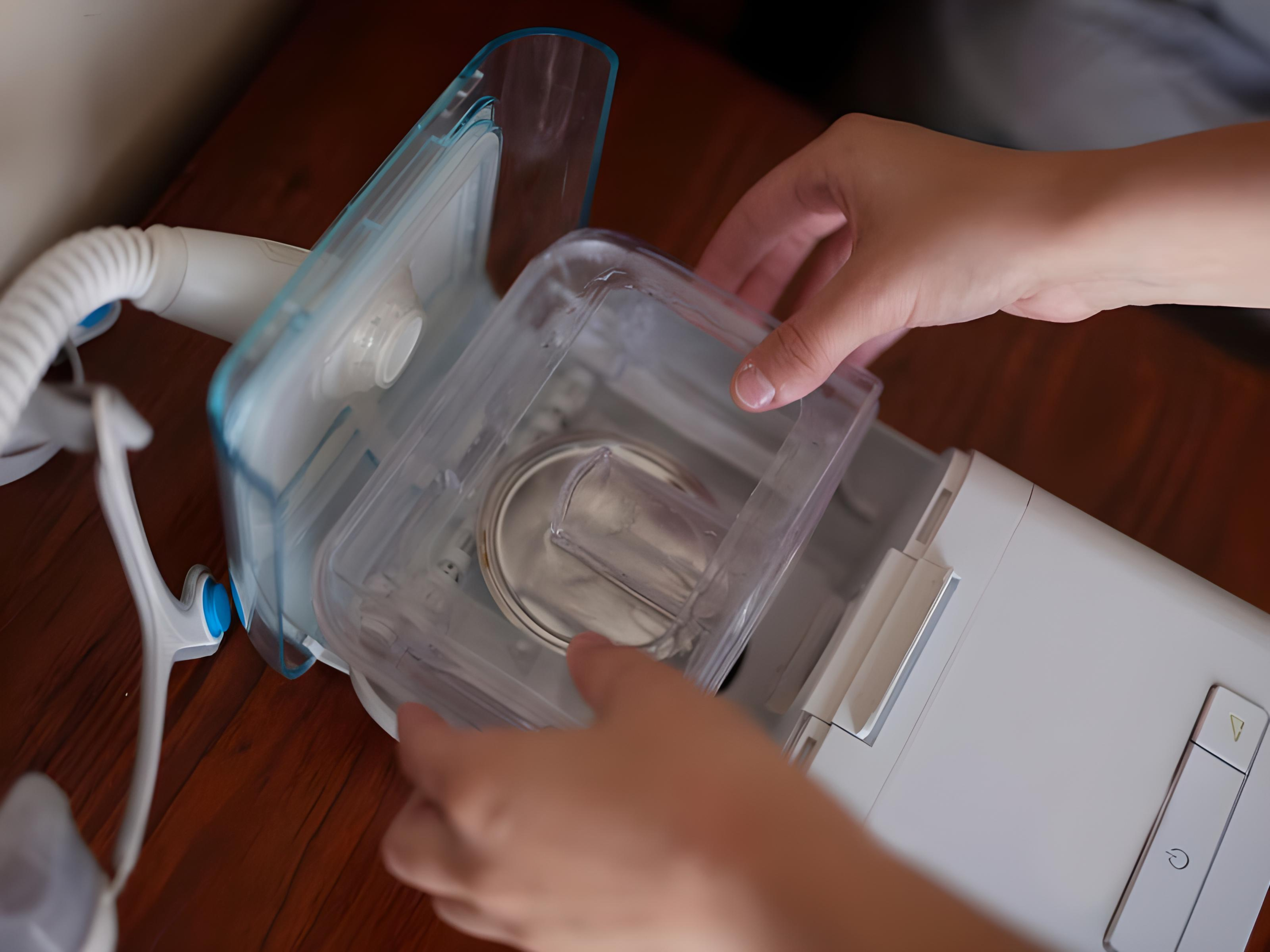
Proper maintenance of the CPAP water tank and humidifier is essential for ensuring the longevity of your CPAP machine and the health of its user. Regular and correct maintenance practices are key components of effective CPAP therapy.
Regular Cleaning
It’s essential to clean the water tank and humidifier regularly. Empty any leftover water each morning and let the tank and humidifier air dry. This prevents bacteria and mold growth, which can be harmful when inhaled.
Using The Right Water
As discussed earlier, using distilled or purified water can significantly reduce the risk of mineral buildup. This makes the cleaning process easier and less frequent, as there are fewer mineral deposits to remove.
Disinfecting The Components
Use mild soap and warm water for routine cleaning. For deeper cleaning, it’s recommended to use a solution specifically designed for CPAP machines or a mixture of water and vinegar to disinfect and remove any mineral deposits.
Replacement Schedule
Regularly inspect the water tank and heated humidifier for any signs of wear or damage. Follow the manufacturer’s guidelines on when to replace these components to ensure the machine functions effectively.
Avoiding Tap Water
Refrain from using tap water to clean these components, as it can leave mineral residues. Instead, use distilled or purified water for both cleaning and usage in the machine.
By following these best practices, you can ensure your machine remains clean, efficient, and safe to use.
Conclusion
In summary, this CPAP water FAQ has aimed to clarify the best practices and address common concerns regarding water usage in CPAP therapy. For those seeking top-quality CPAP supplies and accessories, Resway stands as a top online seller. They offer a range of products tailored to enhance your CPAP experience, ensuring your therapy is as effective and comfortable as possible.
Remember, the right water choice and proper maintenance of your CPAP equipment are crucial for both the longevity of the machine and your own health. By following the guidelines discussed, you can ensure a safer, more effective CPAP therapy experience.



